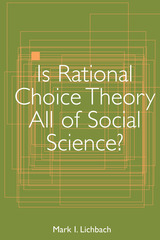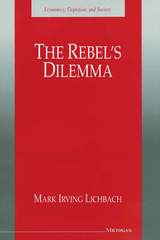2 books about Lichbach, Mark I.

Is Rational Choice Theory All of Social Science?
Mark I. Lichbach
University of Michigan Press, 2003
Advocates of rational choice theory in political science have been perceived by their critics as attempting to establish an intellectual hegemony in contemporary social science, to the detriment of alternative methods of research. The debate has gained a nonacademic audience, hitting the pages of the New York Times and the New Republic. In the academy, the antagonists have expressed their views in books, journal articles, and at professional conferences.
Mark I. Lichbach addresses the question of the place of rational choice theory in the social sciences in general and in political science in particular. He presents a typology of the antagonists as either rationalist, culturalist, or structuralist and offers an insightful examination of the debate. He reveals that the rationalist bid for hegemony and synthesis is rooted in the weaknesses, not the strengths, of rationalist thought. He concludes that the various theoretical camps are unlikely to accept the claimed superiority of the rationalist approach but that this opposition is of value in itself to the social sciences, which requires multiple perspectives to remain healthy.
With its penetrating examination of the assumptions and basic arguments of each of the sides to this debate, this book cuts through the partisan rhetoric and provides an essential roadmap for the future of the discipline.
Mark I. Lichbach is Professor of Government and Politics, University of Maryland.
Mark I. Lichbach addresses the question of the place of rational choice theory in the social sciences in general and in political science in particular. He presents a typology of the antagonists as either rationalist, culturalist, or structuralist and offers an insightful examination of the debate. He reveals that the rationalist bid for hegemony and synthesis is rooted in the weaknesses, not the strengths, of rationalist thought. He concludes that the various theoretical camps are unlikely to accept the claimed superiority of the rationalist approach but that this opposition is of value in itself to the social sciences, which requires multiple perspectives to remain healthy.
With its penetrating examination of the assumptions and basic arguments of each of the sides to this debate, this book cuts through the partisan rhetoric and provides an essential roadmap for the future of the discipline.
Mark I. Lichbach is Professor of Government and Politics, University of Maryland.
[more]

The Rebel's Dilemma
Mark Irving Lichbach
University of Michigan Press, 1998
Since the mid 1960s, theorists have elaborated over two dozen different solutions to the collection action problem. During much of this same period, students of conflict have explored many questions about protest and rebellion. The Rebel's Dilemma examines what happens when one brings the full richness of collective action theories to bear on the many complex problems of collective dissent.
". . . a significant contribution to the understanding of collective behavior, protest, and rebellion." --Choice
"The book is interesting and thought-provoking, and its insights extend beyond the narrow subject of rebellion to help illuminate many issues related to organizing groups to undertake collective action." --Public Choice
"[Lichbach's] book is monumental and pivotal. . . . [It] consolidates over three decades of research on collective action problems and sets the agenda for future studies of collective dissent and rebellion. . . . [This] book is a major step forward. It will have an enormous impact in the field of conflict studies and belongs on the shelf of anyone even casually interested in dissent, rebellion, and revolution. . . . [This] book is a major step forward. It will have an enormous impact in the field of conflict studies and belongs on the shelf of anyone even casually interested in dissent, rebellion, and revolution." --American Political Science Review
"For scholars interested in game-theoretic analyses of politics . . . essential reading." --Manus I. Midlarsky, Journal of Politics
"Lichbach has to be praised for providing valuable insight on the logic of collective dissent. . . ." --Political Studies
Mark Irving Lichbach is Professor of Political Science, University of Colorado.
". . . a significant contribution to the understanding of collective behavior, protest, and rebellion." --Choice
"The book is interesting and thought-provoking, and its insights extend beyond the narrow subject of rebellion to help illuminate many issues related to organizing groups to undertake collective action." --Public Choice
"[Lichbach's] book is monumental and pivotal. . . . [It] consolidates over three decades of research on collective action problems and sets the agenda for future studies of collective dissent and rebellion. . . . [This] book is a major step forward. It will have an enormous impact in the field of conflict studies and belongs on the shelf of anyone even casually interested in dissent, rebellion, and revolution. . . . [This] book is a major step forward. It will have an enormous impact in the field of conflict studies and belongs on the shelf of anyone even casually interested in dissent, rebellion, and revolution." --American Political Science Review
"For scholars interested in game-theoretic analyses of politics . . . essential reading." --Manus I. Midlarsky, Journal of Politics
"Lichbach has to be praised for providing valuable insight on the logic of collective dissent. . . ." --Political Studies
Mark Irving Lichbach is Professor of Political Science, University of Colorado.
[more]
READERS
Browse our collection.
PUBLISHERS
See BiblioVault's publisher services.
STUDENT SERVICES
Files for college accessibility offices.
UChicago Accessibility Resources
home | accessibility | search | about | contact us
BiblioVault ® 2001 - 2024
The University of Chicago Press









